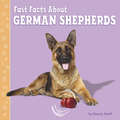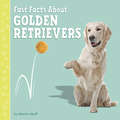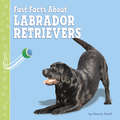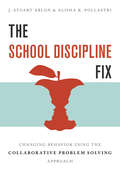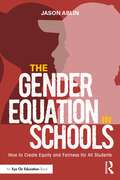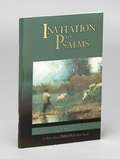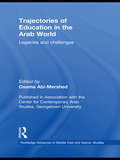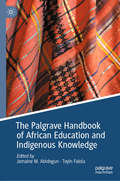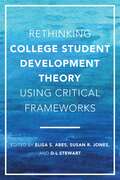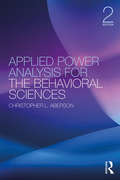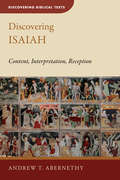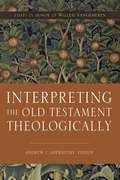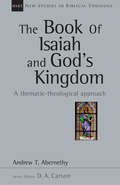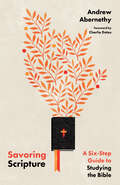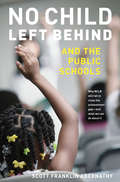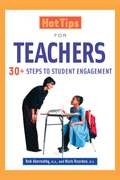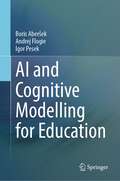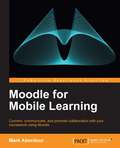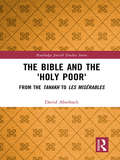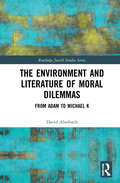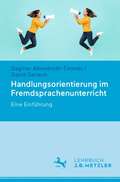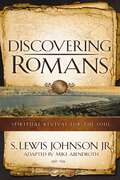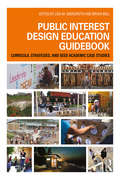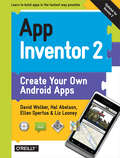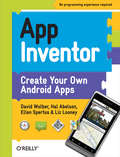- Table View
- List View
Fast Facts About German Shepherds (Fast Facts About Dogs)
by Marcie AboffCalling all German shepherd lovers! Ever wondered about a German shepherd's personality? Want to find out the best way to care for a German shepherd? Kids will learn all about German shepherds with fun facts, beautiful photos, and a canine activity.
Fast Facts About Golden Retrievers (Fast Facts About Dogs)
by Marcie AboffCalling all golden retriever lovers! Ever wondered about a golden retriever's personality? Want to find out the best way to care for a golden retriever? Kids will learn all about golden retrievers with punchy facts, beautiful photos, and a fun activity.
Fast Facts About Labrador Retrievers (Fast Facts About Dogs)
by Marcie AboffCalling all Labrador retriever lovers! Ever wondered about a Labrador retriever's personality? Want to find out the best way to care for a Labrador retriever? Kids will learn all about Labrador retriever with fun facts, beautiful photos, and a canine activity.
The School Discipline Fix: Changing Behavior Using The Collaborative Problem Solving Approach
by J. Stuart Ablon Alisha R. PollastriA complete guide to a paradigm-shifting model of school discipline. Disruptive students need problem-solving skills, not punishment. Traditional school discipline is ineffective and often damaging, relying heavily on punishments and motivational procedures aimed at giving students the incentive to behave better. There is a better way. Dr. Ablon and his co-author Dr. Pollastri have been working with schools throughout the world to refine the Collaborative Problem-Solving (CPS) approach, creating a step-by-step program for educators based on the recognition—from research in neuroscience—that challenging classroom behaviors are due to a deficit of skill, not will. This book provides everything needed to implement the program, including reproducible assessment tools to pinpoint skill deficits in areas like frustration tolerance and flexibility that are at the root of students' challenging behaviors. Whether you are a teacher, counselor, coach, or administrator, the CPS approach to school discipline will provide you with a new mindset, an assessment process, and an effective intervention plan for each of your challenging students. You will walk away with strategies that are immediately actionable with the students in your life.
The Gender Equation in Schools: How to Create Equity and Fairness for All Students
by Jason AblinThis compelling book takes you inside a teacher’s journey to explore the question of gender in education. Jason Ablin uses his background in math teaching, school leadership, and neuroscience to present expert interviews, research, and anecdotes about gender bias in schools and how it impacts our best efforts to educate children. He provides practical takeaways on how teachers and leaders can do better for students. There is also a handy Appendix with step-by-step guides for facilitating faculty-wide conversations around gender; writing learning reports without gender bias; using student assessments to check gendered attitudes about learning; evaluating learning spaces; and creating an inquiry map of your classroom. As a teacher, administrator, DEI director, or homeschooling parent, with the strategies and stories in this book, you’ll be ready to embark upon your own journey to balance the gender equation and create greater equity for all of your students.
Invitation to Psalms: A Short-Term DISCIPLE Bible Study
by AbingdonThe Leader Guide provides process guidance for weekly group sessions. The Leader Guide understands the role of leader as facilitator of small-group sessions. Procedures for guiding sessions include: directions for using related video segments, and questions for discussion. Make a deeper connection to the world of the Psalms so that these well known scriptures can help you give voice to all aspects of our human experience–joy, faith, uncertainty and sorrow. During two weekly video segments, experience a varied presentation of individual Psalm texts, including dramatic reading, music, dance, and images. Listen to insights into specific Psalms presented by one of two biblical scholars through an informal, roundtable conversation format Ideal experience for adults who are interested in the practice of prayer and worship and would like to connect prayer practice with Scripture. The study is accessible for adults with little prior Bible experience. Participants for this Invitation to Psalms do not have to have an in-depth knowledge of the Bible to enjoy and benefit from participation. Reading just two chapters of Psalms a week, they will discover the life altering stories that will invite them to follow Christ as true disciples. This ten-week study includes a participant book outlining daily reading assignments for group preparations, a leader guide suggesting discussion activities for use in the 60–90-minute weekly meeting, and a video component providing interpretation and context for the biblical texts. Michael Jinkins is an ordained Minister of Word and Sacrament in the Presbyterian Church (USA). He serves as Dean of Austin Presbyterian Theological Seminary, where he is also Professor of Pastoral Theology. Michael is the author of eleven books, including In the House of the Lord: Inhabiting the Psalms of Lament, Invitation to Theology, and Letters to New Pastors. Sessions: Word of God, Words of Prayer The Prayer Book of God’s People Praying the Psalms The Language of the Heart A Geography of the Imagination A Theology of the Imagination Lament and Praise Grace and Repentance Love and Wrath Hallelujah and Amen
Trajectories of Education in the Arab World: Legacies and Challenges (Routledge Advances in Middle East and Islamic Studies)
by Osama Abi-MershedTrajectories of Education in the Arab World gives a broad yet detailed historical and geographical overview of education in Arab countries. Drawing on pre-modern and modern educational concepts, systems, and practices in the Arab world, this book examines the impact of Western cultural influence, the opportunities for reform and the sustainability of current initiatives. The contributors bring together analyses and case studies of educational standards and structures in the Arab world, from the classical Islamic period to contemporary local and international efforts to re-define the changing needs and purposes of Arab education in the contexts of modernization, multiculturalism, and globalization. Taking a thematic and chronological approach, the first section contrasts the traditional notions, approaches, and standards of education with the changes that were initiated or imposed by European influences in the nineteenth century. The chapters then focus on the role of modern state-based educational systems in constructing and preserving national identities, cultures, and citizenries and concentrates on the role of education in state-formation and the reproduction of socio-political hierarchies. The success of educational reforms and policy-making is then assessed, offering perspectives on future trends and prospects for generating institutional and organizational change. This book will be of interest to graduate and postgraduate students and scholars of education, history, Arab and Islamic history and the Middle East and North Africa.
The Palgrave Handbook of African Education and Indigenous Knowledge
by Jamaine M. Abidogun Toyin FalolaThis handbook explores the evolution of African education in historical perspectives as well as the development within its three systems–Indigenous, Islamic, and Western education models—and how African societies have maintained and changed their approaches to education within and across these systems. African education continues to find itself at once preserving its knowledge, while integrating Islamic and Western aspects in order to compete within this global reality. Contributors take up issues and themes of the positioning, resistance, accommodation, and transformations of indigenous education in relationship to the introduction of Islamic and later Western education. Issues and themes raised acknowledge the contemporary development and positioning of indigenous education within African societies and provide understanding of how indigenous education works within individual societies and national frameworks as an essential part of African contemporary society.
Rethinking College Student Development Theory Using Critical Frameworks
by Elisa S. Abes Susan R. Jones D. L. StewartA major new contribution to college student development theory, this book brings “third wave” theories to bear on this vitally important topic for anyone working on campus today. The book has three sections: The first briefly introduces the third wave theories that have recently expanded the frame of the topic; the second uses those theories to focus on specific aspects of student development; and the third brings it all together with a few chapters that look at the implications for practice. The first section includes a chapter that provides an overview of the evolution of student development theories as well as chapters describing the critical and post structural theories most relevant to the next iteration of student development theory. These theories include critical race theory, queer theory, feminist theories, intersectionality, decolonizing/indigenous theories, and crip theories. These chapters also include a discussion of how each theory is relevant to the central questions of student development theory. The second section provides critical interpretations of the primary constructs associated with student development theory. These constructs and their related ideas include resilience, dissonance, socially constructed identities, authenticity, agency, context, development (consistency/coherence/stability), and knowledge (sources of truth and belief systems). Each chapter begins with brief personal narratives on a particular construct; the chapter authors then re-envision the narrative’s highlighted construct using one or more critical theories. The third section will focus on implications for practice. Specifically, these chapters will consider possibilities for how student development constructs re-envisioned through critical perspectives can be utilized in practice. The primary audience for the book is faculty members who teach in graduate programs in higher education and student affairs and their students. It may also be of interest to faculty and graduate students in psychology, sociology, and ethnic studies, as well as women’s, gender, and sexuality studies departments. The book will also be useful to practitioners seeking guidance in working effectively with students across the convergence of multiple aspects of identity and development.
Applied Power Analysis for the Behavioral Sciences: 2nd Edition
by Christopher L. AbersonApplied Power Analysis for the Behavioral Sciences is a practical "how-to" guide to conducting statistical power analyses for psychology and related fields. The book provides a guide to conducting analyses that is appropriate for researchers and students, including those with limited quantitative backgrounds. With practical use in mind, the text provides detailed coverage of topics such as how to estimate expected effect sizes and power analyses for complex designs. The topical coverage of the text, an applied approach, in-depth coverage of popular statistical procedures, and a focus on conducting analyses using R make the text a unique contribution to the power literature. To facilitate application and usability, the text includes ready-to-use R code developed for the text. An accompanying R package called pwr2ppl (available at https://github.com/chrisaberson/pwr2ppl) provides tools for conducting power analyses across each topic covered in the text.
Discovering Isaiah: Content, Interpretation, Reception (Discovering Biblical Texts (DBT))
by Andrew T. AbernethyThis concise introduction to the interpretation of the book of Isaiah encourages in-depth study of the text and deliberate grappling with related theological and historical questions by providing a critical assessment of key interpreters and interpretative debates. It draws on a range of methodological approaches (author-, text-, and reader-centered) and reflects the growing scholarly attention to the reception history of biblical texts, increasingly viewed as a vital aspect of interpretation rather than an optional extra.
Interpreting the Old Testament Theologically: Essays in Honor of Willem A. VanGemeren
by Andrew T. AbernethyHow should Christians read the Old Testament today? Answers to this question gravitate between two poles. On the one hand, some pay little attention to the gap between the Old Testament and today, reading the Old Testament like a devotional allegory that points the Christian directly to Jesus. On the other hand, there are folks who prioritize an Old Testament passage’s original context to such an extent that it is by no means clear if and how a given Old Testament text might bear witness to Christ and address the church.This volume is a tribute to Willem A. VanGemeren, an ecclesial scholar who operated amidst the tension between understanding texts in their original context and their theological witness to Christ and the church. The contributors in this volume share a conviction that Christians must read the Old Testament with a theological concern for how it bears witness to Christ and nourishes the church, while not undermining the basic principles of exegesis.Two questions drive these essays as they address the topic of reading the Old Testament theologically.Christology. If the Old Testament bears witness to Christ, how do we move from an Old Testament text, theme, or book to Christ?Ecclesiology. If the Old Testament is meant to nourish the church, how do scriptures originally given to Israel address the church today?The volume unfolds by first considering exegetical habits that are essential for interpreting the Old Testament theologically. Then several essays wrestle with how topics from select Old Testament books can be read theologically. Finally, it concludes by addressing several communal matters that arise when reading the Old Testament theologically.
The Book of Isaiah and God's Kingdom: A Thematic-Theological Approach (New Studies in Biblical Theology #Volume 40)
by Andrew AbernethyThe book of Isaiah has nourished the church throughout the centuries. However, its massive size can be intimidating; its historical setting can seem distant, opaque, varied; its organization and composition can seem disjointed and fragmented; its abundance of terse, poetic language can make its message seem veiled—and where are those explicit prophecies about Christ? These are typical experiences for many who try to read, let alone teach or preach, through Isaiah. Andrew Abernethy's conviction is that thematic points of reference can be of great help in encountering Isaiah and its rich theological message. In view of what the structure of the book of Isaiah aims to emphasize, this New Studies in Biblical Theology volume employs the concept of "kingdom" as an entry point for organizing the book's major themes. In many respects, Isaiah provides a people living amidst imperial contexts with a theological interpretation of them in the light of YHWH's past, present and future sovereign reign. Four features of "kingdom" frame Abernethy's study: God, the King; the lead agents of the King; the realm of the kingdom and the people of the King. While his primary aim is to show how "kingdom" is fundamental to Isaiah when understood within its Old Testament context, interspersed canonical reflections assist those who are wrestling with how to read Isaiah as Christian Scripture in and for the church. Addressing key issues in biblical theology, the works comprising New Studies in Biblical Theology are creative attempts to help Christians better understand their Bibles. The NSBT series is edited by D. A. Carson, aiming to simultaneously instruct and to edify, to interact with current scholarship and to point the way ahead.
Savoring Scripture: A Six-Step Guide to Studying the Bible
by Andrew AbernethySome books on how to read the Bible are academically informative, but their rationality can make God seem distant.andPostureFlowContextWhole BibleSavor GodFaithful responseChapters provide guidance on interpreting biblical genres, factoring in historical backgrounds, reading each passage in context, tracing the redemptive storyline of Scripture, and more. Then, building on a strong grasp of Scripture's meaning, readers engage the traditional practice of lectio divina and consider how to respond faithfully to the text. The goal, Abernethy says, is to encounter God and to be shaped by the Word as we savor its richness.Savoring Scripture
No Child Left Behind and the Public Schools
by Scott Franklin AbernathyThe oft-stated purpose of the No Child Left Behind Act of 2001 (NCLB) to close achievement gaps between advantaged and disadvantaged students will likely go unfulfilled without significant rethinking and revision, argues Abernathy (political science, U. of Minnesota). He examines the current impacts of NCLB on public school leadership; criticizes its failure to take into account the determining factors of race, ethnicity, and inequality on achievement test scores; and considers how NCLB interacts with the school-choice approach. He then offers advice on reforming NCLB that calls for directly measuring leadership and quality within educational institutions rather than trying to extract such information from student test scores and creating reward incentives based on those assessments. Annotation ©2007 Book News, Inc., Portland, OR (booknews.com)
Hot Tips for Teachers: 30+ Steps to Student Engagement
by Rob Abernathy Mark ReardonThese teaching tips help educators grab and maintain students’ attention through engaging presentation techniques for tone of voice, body language, pacing, and graphic displays. Each tip includes an explanation of the strategy, an activity to help readers integrate the skill into their repertoire, a learning strategy, and a self-reflection prompt.
AI and Cognitive Modelling for Education
by Boris Aberšek Andrej Flogie Igor PesekThis book offers a groundbreaking approach to bridging the gap between various disciplines involved in cognitive modeling in education. By drawing on the fields of learning, neuro science, cognitive science, neurobiology, and computer science, it provides a new perspective on how we can integrate these disciplines with education to create more effective learning environments. The main objective of this book is to delve into the ethical, sociological, and technological questions surrounding the introduction of intelligent and smart learning environments in education. By analyzing these issues, this book aims to bridge the gap between the various disciplines involved in cognitive modeling and education, while highlighting the benefits and risks associated with these advancements. With the emergence of AI-based tutors, coaches, and learning environments, students now have access to a new type of self-learning and self-training that was previously unavailable. Distance learning has become increasingly popular in recent years, and the use of computer-assisted learning tools has revolutionized the way we think about education. The goal of education must be to instill in students a desire to learn for themselves, and this can only be achieved through active, self-directed, and reflective learning. With intelligent tutoring systems, students are empowered to take an active role in their own education, rather than simply being passive recipients of information. This book offers practical strategies for teachers to facilitate this transition, enabling them to act as facilitators and guides rather than one-way communicators. By embracing this new approach to education, we can help students become lifelong learners who are equipped with the skills they need to succeed in the 21st century. As we cannot predict the future with certainty, the true effects of education may only be revealed in the long run, making it critical to understand the potential consequences of introducing these new learning tools. By exploring these complex topics, this book offers valuable insights for educators, policymakers, and anyone interested in the future of education.
Moodle for Mobile Learning
by Mark AberdourA guide with practical examples that gives you hands-on knowledge in creating learning environments for Mobile devices using Moodle, while also empowering you to create your own effective mlearning course designs."Moodle for Mobile Learning" is primarily aimed at Moodle course practitioners - teachers, tutors, instructors, and learning and development professionals. It does not require you to have an in-depth knowledge about any mobile technologies. It is for anyone who has the desire to deliver great courses that allow their learners to interact using the devices in their pockets.
The Bible and the 'Holy Poor': From the Tanakh to Les Misérables (Routledge Jewish Studies Series)
by David AberbachThe Hebrew Bible is the main legislative and literary influence on European Poor Law and on literature on poverty and the poor. No extant literature from the ancient world placed more importance upon social welfare and the duty of the better-off toward the poor. It is the founding text for liberation movements. This book assesses why the Bible is so unambiguously positive in its view of the poor, unlike most later literary and legislative works. It seeks to understand what historical circumstances brought about this elevated perception of the poor, by exploring the clash of ideals and realities in the depiction of the poor in the Hebrew Bible and in European culture. Most legal and literary portrayals of the poor tend to be critical, associating the poor with laziness, crime or fraud: why is this not the case in the Bible? Most societies have tended to accept poverty as a natural condition, but not the Bible. The idea of ending poverty starts in the Bible – the Psalms above all inspired a daily struggle to limit the gap between rich and poor. Much of the Bible sees life - most unusually in the history of civilizations - through the eyes of the poor. The book argues that the popular appeal of the Bible in largely impoverished societies lies in its persistent relevance to, and support of, the poor. Yet, in many ways, biblical teachings were incompatible with social and political circumstances centuries and millennia later. Written in a clear, accessible style, the book shows how the Hebrew Bible, in its legislation and impassioned prophetic poetry, inspired the battle to 'make poverty history', to give dignity and hope to the poor and fight inequality. It will appeal to students and scholars of Jewish Studies, the Bible and Comparative Literature, and Development Studies.
The Environment and Literature of Moral Dilemmas: From Adam to Michael K (Routledge Jewish Studies Series)
by David AberbachExploring the literature of environmental moral dilemmas from the Hebrew Bible to modern times, this book argues the necessity of cross-disciplinary approaches to environmental studies, as a subject affecting everyone, in every aspect of life. Moral dilemmas are central in the literary genre of protest against the effects of industry, particularly in Romantic literature and ‘Condition of England’ novels. Writers from the time of the Industrial Revolution to the present—including William Blake, Elizabeth Gaskell, Charles Dickens, Émile Zola, Henrik Ibsen, Anton Chekhov, T.S. Eliot, John Steinbeck, George Orwell, and J.M. Coetzee—follow the Bible in seeing environmental problems in moral terms, as a consequence of human agency. The issues raised by these and other writers—including damage to the environment and its effects on health and quality of life, particularly on the poor; economic conflicts of interest; water and air pollution, deforestation, and the environmental effects of war—are fundamentally the same today, making their works a continual source of interest and insight. Sketching a brief literary history on the impact of human behavior on the environment, this volume will be of interest to readers researching environmental studies, literary studies, religious studies and international development, as well as a useful resource to scientists and readers of the Arts.
Handlungsorientierung im Fremdsprachenunterricht: Eine Einführung
by Dagmar Abendroth-Timmer David GerlachDieser Band entwickelt das Konzept der Handlungsorientierung in fremdsprachendidaktischer wie bildungstheoretischer Hinsicht weiter: Lernende als autonom agierende Individuen mit je unterschiedlichen (Sprachlern-)Biographien werden mit ihrer kulturellen Identität und ihrem sprachlichen Handeln in den Mittelpunkt gerückt. Gleichzeitig wird das Fremdsprachenlernen methodisch differenziert und als kontextgebunden verstanden. Lehrpersonen erschaffen für und mit den Lernenden inhaltlich bedeutsame Lernsituationen. – Eine fremdsprachenübergreifende Einführung mit Definitionen, Vertiefungen und zahlreichen Praxisbeispielen für alle Phasen der Fremdsprachenlehrer*innenbildung.
Discovering Romans: Spiritual Revival for the Soul
by Mike Abendroth S. Lewis JohnsonDiscovering Romans: Spiritual Revival for the Soul is a popular level guide by outstanding Bible teacher S. Lewis Johnson that opens up the motivating truths found in the apostle Paul’s powerful letter to the Romans. Anyone hungry to grow in practical understanding of Scripture will profit from Johnson’s rich teaching that stimulates both mind and emotions. This beloved pastor and professor works through the text engagingly, providing both clarifying insights and life applications along the way. Each chapter ends with reflection questions, making this volume useful not only for individual reading (or preparation for teaching) but also in small group Bible studies. John MacArthur once said, “Through the years I have listened to the preaching of S. Lewis Johnson far more than any other preacher.” Reading through this volume will be a soul-reviving experience.
Public Interest Design Education Guidebook: Curricula, Strategies, and SEED Academic Case Studies (Public Interest Design Guidebooks)
by Lisa M. Abendroth Bryan BellPublic Interest Design Education Guidebook: Curricula, Strategies, and SEED Academic Case Studies presents the pedagogical framework and collective curriculum necessary to teach public interest designers. The second book in Routledge’s Public Interest Design Guidebook series, the editors and contributors feature a range of learning competencies supported by distinct teaching strategies where educational and community-originated goals unite. Written in a guidebook format that includes projects from across design disciplines, this book describes the learning deemed most critical to pursuing an inclusive, informed design practice that meets the diverse needs of both students and community partners. Featured chapter themes include Fundamental Skills, Intercultural Competencies, Engaging the Field Experience, Inclusive Iteration, and Evaluating Student Learning. The book consists of practice-based and applied learning constructs that bridge community-based research with engaged learning and design practice. SEED (Social Economic Environmental Design) academic case studies introduce teaching strategies that reinforce project-specific learning objectives where solving social, economic, and environmental issues unites the efforts of communities, student designers, and educators. This comprehensive publication also contains indices devoted to learning objectives cross-referenced from within the book as well as considerations for educational program development in public interest design. Whether you are a student of design, an educator, or a designer, the breadth of projects and teaching strategies provided here will empower you to excel in your pursuit of public interest design.
App Inventor
by Hal Abelson David Wolber Ellen Spertus Liz LooneyYes, you can create your own apps for Android phones--and it's easy to do. This extraordinary book introduces App Inventor for Android, a powerful visual tool that lets anyone build apps for Android-based devices. Learn the basics of App Inventor with step-by-step instructions for more than a dozen fun projects, such as creating location-aware apps, data storage, and apps that include decision-making logic. The second half of the book features an Inventor's manual to help you understand the fundamentals of app building and computer science. App Inventor makes an excellent textbook for beginners and experienced developers alike. Design games and other apps with 2D graphics and animation Create custom multi-media quizzes and study guides Create a custom tour of your city, school, or workplace Use an Android phone to control a LEGO® MINDSTORMS® NXT robot Build location-aware apps by working with your phone's sensors Explore apps that incorporate information from the Web Learn computer science as you build your apps
App Inventor
by Hal Abelson David Wolber Ellen Spertus Liz LooneyYes, you can create your own apps for Android phones—and it's easy to do. This extraordinary book introduces App Inventor for Android, a powerful visual tool that lets anyone build apps for Android-based devices. Learn the basics of App Inventor with step-by-step instructions for more than a dozen fun projects, such as creating location-aware apps, data storage, and apps that include decision-making logic.The second half of the book features an Inventor's manual to help you understand the fundamentals of app building and computer science. App Inventor makes an excellent textbook for beginners and experienced developers alike.Design games and other apps with 2D graphics and animationCreate custom multi-media quizzes and study guidesCreate a custom tour of your city, school, or workplaceUse an Android phone to control a LEGO® MINDSTORMS® NXT robotBuild location-aware apps by working with your phone’s sensorsExplore apps that incorporate information from the WebLearn computer science as you build your apps
